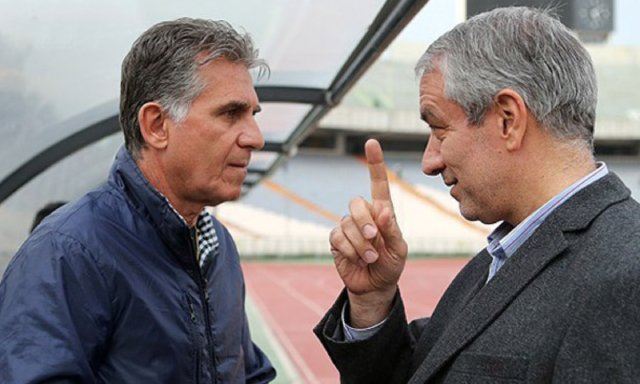The Persian version of this article has printed in “Goal” daily, Dated: Monday, January 16, 2017.
Woe to the day you fall out of favor with people
Vahid Namazi
1- The 2014 World Cup in Brazil has concluded for Iran’s national team, and the soaring hopes of a nation—still dreaming of halting Argentina—have suddenly frozen. They rewrite the final five minutes of that proud match in their minds, refusing to accept the humiliation against Bosnia. Yet, they melt the icebergs and frozen seas standing before their national team’s coach, never abandoning him. The national team returns to Tehran. The people welcome their heroes. The minister greets Queiroz. Cameras capture smiles, crafting stories, while sarcastic remarks line up: “In football, there are no goodbyes when you’re always at peace.” The public deems the national team’s performance in Brazil honorable. Everyone says the country’s sports officials have no interest in retaining Queiroz, but the “will of the people” dictates otherwise. The smiling federation president sets his sights on the Asian Cup and Russia 2018, keeping the Portuguese coach—whose contract value ranked sixth among World Cup coaches—despite Queiroz’s own words: “The officials don’t want me, and I already have offers from teams in Brazil and England!”
2- The 2015 Asian Cup in Australia has ended for Iran’s national team, and the nightmare of elimination, failing to reach the final four, has once again torn at the heart of a nation, shattering the dreams of people who envisioned an Asian final victory. The atmosphere is sharply polarized, with the usual black-and-white divisions and the eternal clash of good versus evil—familiar from countless similar experiences—spanning from the unheated taxis on the Railway-Vanak route to the minister’s office on Seoul Street, stripping away any space for rational thought. Queiroz himself labels Qhalenoei and Derakhshan as the ringleaders of opposition to Iran’s success, calling them traitors to the national team and speaking of the need to change his behavior. The national team players, domestic coaches, and the people rally behind him once more. Adel Ferdosipour brings him back to Navad. A poll is conducted, flaunting Queiroz’s 90% popularity to his detractors. Their game is over; “Mr. Resignation” wins with the support of a people who believe he has introduced a new generation to Iranian football. He is, once again, “indebted to the people”—those same taxi drivers on cold streets. Yet, at the end of the program, he plays coy again: “Under these conditions, I cannot continue, and I’ll tell Kaffashian we should part ways amicably…”
3- And this new tale of “resignation for the third time” is one we all know by now. There’s no doubt that Carlos Queiroz has rendered significant services to Iranian football, with instilling character in the national team being just one of them. But isn’t a nation’s team a symbol of its people and society? When he resorts to repeated resignations, recycled tactics to gain leverage, expelling seven players from the national team camp, fueling disputes with another non-Iranian coach (who, at least, seems to have heeded advice and stayed silent), and, worst of all, challenging the highest levels of Iranian football management by accusing the federation president of incompetence, isn’t he, in effect, targeting the dignity of the federation, the national team, and, ultimately, the honor of the Iranian people? What justification remains for these same people to defend him against his staunch opponents? For those of us who have supported the repeated renewals of “Mr. Resignation’s” contract with Iran, what part of Queiroz’s record should we take pride in? The lackluster, disorganized performances in the World Cup, where only the memorable battle against Argentina is defensible, or the elimination in the Asian Cup knockout stage—a feat that, after the memorable third-place finish in 2004 under Branco, has been repeated with Qhalenoei, Ghotbi, and Queiroz himself? If only the man who constantly threatens to leave would remember that every time he’s played the tune of departure, it was only the people who kept him here.

